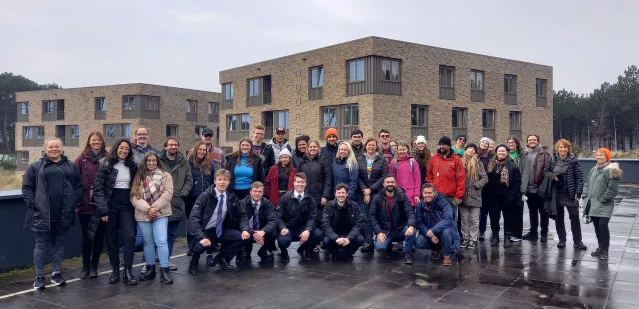
Tired, but very fulfilled. That's how Stefanie Böhler from Austria describes her week abroad. For her studies, she has been abroad before, but not for as long and not as far as now. She is following the SAP ‘Preventing the social exclusion of young people’: a short advanced program to apply inclusive methods to improve the well-being of young people and help prevent social exclusion. Her motivation? "I really wanted to take on a foreign experience."
The social work student does not have a lot of time, as she still has to catch the train, but after the final presentations and the closing wrap up, Stefanie looks back on the week in the pit of the NHL Stenden building. "I wanted to meet new people and gain new insights for my studies and work. I succeeded in both. It has been hugely educational: for myself as a person and as a professional. You get to know others, but also yourself even better. That's what it was all about for me."
Working towards a vital region
Stefanie studies at FH Vorarlberg, a college in Dornbirn, Austria, and, like NHL Stenden, affiliated with RUN-EU (Regional University Network-European University). This is a network of seven - soon to be nine - European higher education institutions, which supports NHL Stenden's ambitions in a variety of areas. Among other things, RUN-EU contributes to the sustainable economic, social, cultural and ecological development of the northern region.
We are all regional colleges and therefore deal with mostly the same social issues
"As cooperating partners, we did not come together by chance," says Joke van der Veen, program manager at NHL Stenden for the Vital Regions axis. "We are all regional colleges and therefore deal with mostly the same social issues. By exchanging students, but also teachers, researchers and people from local governments and civil society organizations, we learn from each other and can focus this knowledge on our own region."
Students can participate in longer or shorter study programs at home or abroad on a variety of topics thanks to RUN-EU, the common denominators being cooperation and regional practical issues (SAPs). One of these is "Preventing the social exclusion of young people," in which Stefanie is participating. The SAP was jointly developed and organized by NHL Stenden with FH Vorarlberg and - the initiator of the study program - HAMK University of Applied Sciences from Finland.
Gaining inspiration and knowledge
This is the second time that 'Preventing the social exclusion of young people' is taking place. Last year online from Finland and now in real life in Fryslân. Central during the SAP is social inclusion. The students will spend a total of seven weeks working on these issues: six weeks online - with a kick-off and a final conference - and one week face to face in between. A lot of inspiration and knowledge is gained during the week in Leeuwarden, says lector Janneke Metselaar, one of the organizers of the SAP.
"The week flew by," Janneke looks back on the fifth and closing day. "We showed off our campus, but also went out together a lot. On the second day we went to Terschelling. We talked to students from MIWB about social issues and visited De Jut Fabriek there, because we also wanted to do something with the climate. We also visited our Inclusive Community Lab Fryslân and Firda's Rebound Fryslân. By actually participating as well, the students got a good impression of our social system and Dutch social innovations during those visits."
So many different insights, backgrounds and life stories: that gives an extra dimension
The experiences gained and insights gained take the students back to their home region: from Brazil to Uzbekistan and from Ireland to Iraq. The SAP participants come from all over the world as well as different fields of study, Janneke points out. "It was a very international group, but also interdisciplinary. It was not only social workers who participated in this SAP, but also architecture and engineering students. So many different insights, backgrounds and life stories: that gives an extra dimension."
Sequence of eye openers
Like Stefanie, Janneke also looks back on a great week. "You know in advance that it's going to be valuable for the students, but how and in what way: that still surprises you. This will always stay with them. And me as well. You experience special moments in such a week. Someone lost his bank card, but the others - they didn't know each other yet on Sunday - didn't worry about it and deposited money with each other. Being able to witness something like that makes me very happy."
"It was a chain of eye-openers anyway," Janneke says. "Young people who meet for the first time in real life and don't know each other, you see as the week progresses more and more and more easily get along. You see them grow towards each other and learn from each other. As professionals, but also simply as human beings. That goes for the students, but also for the group of international teachers with whom we realize this. I am immensely proud of everyone: we have all made a small contribution to our major focus of Vital Regions."




